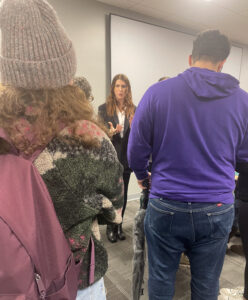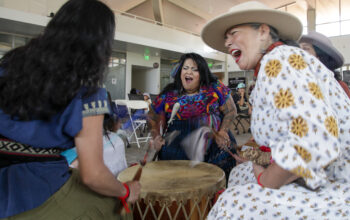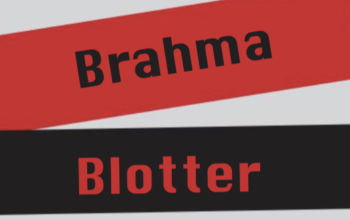
Ariel Ein-Gal, a 26-year-old Israeli and a survivor of the Oct. 7 Hamas terrorist attacks, stood up to the attentive audience and stretched out his left arm, showing a tattoo reading, “20/21.”
“We were 21 at that party, but we only came back 20,” Ein-Gal said. “I did it on the arm like that, some of you can guess, it’s because the Holocaust survivors from Auschwitz did have those numbers, and this is my way, our way to say, ‘Never again is now,’ and this is my story of Oct. 7.”
Ein-Gal, Maya Parizer and her fiancé Ron Alenziki traveled to the U.S. to share their testimonies and are speaking on campuses such as California State University, Northridge (CSUN).
Co-sponsors of the event included Chabad at CSUN, SSI at CSUN, the Alpha Epsilon Pi fraternity and Hillel818, an organization that serves Jewish college students in the San Fernando Valley and meets Mondays on the Pierce College campus with a kosher meal. Two sign language interpreters were present, and among the 10 rows of about 10 chairs filled mostly by students and some by older attendees, there was only a scattering of empty seats.
Parizer and Alenziki survived the Supernova music festival massacre, from which many people were kidnapped and more than 260 bodies have been recovered, and Ein-Gal survived attacks on Zikim Beach.
“The terrorists mounted the shore and they slaughtered everyone there. And I’m telling you—everyone,” Ein-Gal said. “They killed fishermen that came from this beach every day for the past 40 years. They killed fathers and sons that came there to camp. They killed soldiers we saw there the night before, having fun playing backgammon with some girls. And they even killed a 17-year-old couple that came to the beach to celebrate their first love.”
Ein-Gal has now twice extended his stay in the U.S. to continue speaking at sites such as places of worship and universities.
“To hear from them, what’s the situation right now in the U.S. and how it is to be a Jewish student, it was very powerful to hear all the people and all the students and feeling like I’m able to give them the motivation to carry on after they’ve heard what I’ve been through,” Ein-Gal said in a later interview.
Ronit Chavol, a former Pierce student who is studying psychology at CSUN, has been impacted by the events of Oct. 7, and when she heard a survivor was coming to campus, it was something she wanted to show up for.
“Even though we’re on this side of the world, so many of us have family there,” Chavol said. “Even the people who don’t, the Jewish people are like one big family.”
Parizer spoke first, and recounted the initial confusion and slow-coming terror of the morning. After being awoken by hundreds of rockets around 6: 30 a.m., her and Alenziki took their time packing up their belongings and saying goodbye to their friends, not understanding it was something with no end in sight, or not an isolated barrage of rockets that could be waited out in a nearby shelter.
“Then someone from the security came to us and told us, ‘You have to leave right now, it’s dangerous,’” Parizer said. “At that point, we had no idea that so many terrorists are right now infiltrating the State of Israel.”
Hallie Goodman, a CSUN student studying interior design, was in attendance and found it important to listen to the speakers’ personal experiences.
“You just see all the same videos and testimony circling around on social media, a lot of things just get washed out,” Goodman said. “So having people here in-person who were actually there just hits your heart extra hard.”
Parizer also shared the stories of other survivors and victims close to her, including friends who purchased festival tickets at her encouragement.
Her friends were among a few dozen in a public rocket shelter close to the party—which terrorists began throwing grenades into—and those inside would take turns throwing grenades back out until they lacked the body parts to continue. Some from that shelter were taken hostage, and two of her friends were killed and two survived.
A distant cousin of hers on a kibbutz, Ayelet, was murdered, but not before managing to instruct her daughter—hiding in a safe room, a mammad—through text to urinate on a blanket and pull it under the door to avoid being smoked out of the mammad when terrorists set fire to the home.
After the Israelis concluded their stories, they remained at the front of the room to meet and speak with attendees individually.
A few students engaged in conversations in Hebrew and others became emotional as they talked to the speakers about their own family or friends currently in Israel. Many students also approached simply to embrace them and offer brief comments of support.
“There’s a lot going on, and to see students come together to hear stories and really be in community with each other—that’s really the most powerful thing that we can do, continue to show up for each other,” said Assistant Director of Hillel818 Meg Wells.
“Every single Jewish person is dealing with this in some way,” Wells added. “And it all depends on their connection to the Jewish community here in Los Angeles, their family, their communities in Israel. And so to be able to see that they’re not alone, to see a full room gathering to hear stories is really powerful.”
As reported in AP News, about 1,200 Israelis have been killed in the Oct. 7 attacks and in the Israel-Hamas war, and about 11,470 Palestinians have been killed according to Gaza’s Ministry of Health, which does not differentiate between civilian and militant deaths.



